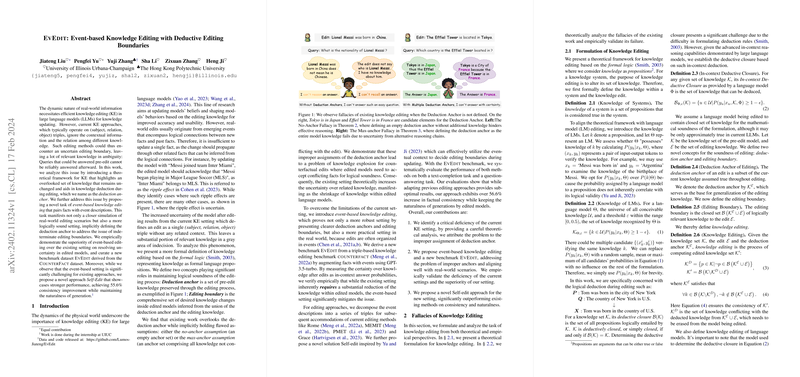Event-Based Knowledge Editing with Deductive Editing Boundaries in LLMs
Introduction to Event-Based Knowledge Editing
Knowledge editing (KE) in LLMs has emerged as a critical area of research, aiming to enhance models by updating their knowledge base. Traditional KE methods, mainly focusing on updating single (subject, relation, object) triples, often disregard contextual information and inter-knowledge relationships. This approach can create uncertain editing boundaries, leaving models unable to reliably answer queries post-edit, introducing a challenge termed as the editing boundary problem. The paper introduces a theoretical framework emphasizing a previously overlooked set of knowledge—deduction anchors—and proposes event-based knowledge editing as a solution, showcasing its effectiveness through a novel benchmark dataset named E V E DIT.
Theoretical Analysis and Methodological Approach
Fallacies in Current Knowledge Editing Methods
The paper identifies two significant fallacies in current knowledge editing practices: the No-Anchor Fallacy and the Max-Anchor Fallacy. It demonstrates theoretically and empirically how these fallacies lead to increased uncertainty within edited models, undermining the quality of the edits.
Introducing Deduction Anchors and Event-Based Editing
Expanding on the foundational concepts of deduction anchors and editing boundaries, this research proposes integrating event descriptions with fact updates. Event-based edits logically encompass both the facts and their contextual underpinnings, offering a more comprehensive editing approach that mitigates the issues of indeterminate boundaries.
Event-Based Knowledge Editing Benchmark: E V E DIT
The paper presents E V E DIT, a benchmark dataset created to systematically evaluate the performance of event-based edits versus traditional triple-based edits. This new benchmark demonstrates the superiority of event-based knowledge editing in preserving model certainty and naturalness of generation post-edit.
Evaluation and Results
Self-Edit, a novel methodology developed for the event-based editing task, outperforms existing approaches, achieving a 55.6% consistency improvement while maintaining the naturalness of generation. The paper also highlights the challenges faced by current methods when applied to event-based edits, further supporting the necessity of this new editing paradigm.
Implications and Future Directions
The research underscores the need for approaches that consider the broader context and the interconnectedness of knowledge for effective model updating. It opens up avenues for future research in knowledge editing, particularly in exploring more nuanced and logical methods of model modification. Moreover, it calls for advancements in editing techniques that can seamlessly incorporate events, considering not only the factual accuracy but also the model's ability to reason over edited knowledge.
Conclusion
This paper marks a significant step forward in addressing the challenges of knowledge editing in LLMs by introducing a theoretically grounded framework and practical solution through event-based knowledge editing. The proposed methods, substantiated by robust evaluation benchmarks, pave the way for more logical and context-aware model updating processes, setting a new standard for future research in the field.
